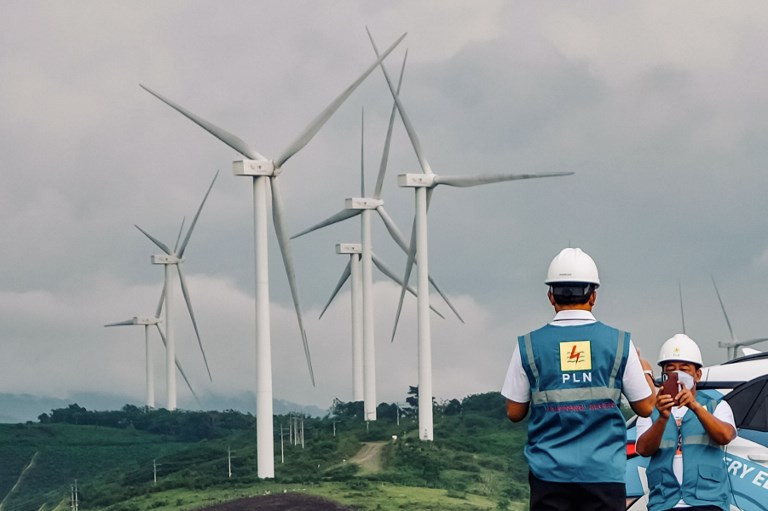Higher oil prices renew calls to speed up energy transition
Energy researchers pointed to the impact of rising oil prices on the state budget and supply costs.
Change Size

R
ising crude oil prices have renewed calls to speed up Indonesia's transition to clean energy as the issue underscores the risks of relying on the largely imported fossil fuel.
Energy researchers have pointed to the impact of rising oil prices on the state budget and supply costs, which jeopardize domestic energy security. They said the high prices were a good impetus to reallocate state resources to renewable energy.
“Our energy security vulnerability will remain high as long as we depend on fossil fuels,” said Institute for Essential Services Reform (IESR) executive director Fabby Tumiwa on Monday, adding that rising prices had made renewable technology more competitive than fossil fuel technology
“The question is whether the government would leverage rising fossil fuel prices to accelerate toward renewables."
Surging global oil prices have put fresh strains on the state budget as the government seeks to balance higher subsidy spending with fiscal consolidation plans. Indonesia is supposed to reinstate a budget deficit cap of 3 percent of GDP by 2023.
International oil benchmark Brent exceeded US$120 a barrel on March 13, double the $63-per-barrel assumption in the 2022 state budget, as the Ukraine crisis exacerbated rising oil prices stemming from the global economic recovery from the pandemic.
Global oil prices are one of six fundamental macroeconomic assumptions used to compile the state budget, along with inflation and oil and gas production figures.
Read also: High oil prices put new strains on state budget
Economic Research Institute for ASEAN and East Asia (ERIA) energy economist Alloysius Joko Purwanto said increasing oil prices should be leveraged to ease the inclusion of new and renewable energy in the National Medium-Term Development Plan (RPJMN) and government working plan (RKP).
“One policy focus that can be implemented in the short term when oil prices are high is capping the number of subsidies for 3-kilogram LPG and electricity,” he said on Friday, referring to liquified petroleum gas (LPG) canisters.
Joko suggested the government gradually reduce fossil fuel subsidies, and allocate state funds for new and renewable energy infrastructure investments such as gas pipelines for households and electric stoves.
Meanwhile, Institute for Energy Economics and Financial Analysis (IEEFA) energy finance analyst Putra Adhiguna noted that Indonesia saw oil prices soar above $100 a barrel in 2008 and 2014 when the country was also struggling to increase its oil production.
“What is different this time? Upstream oil and gas are facing major underinvestments, seeing that international companies are disappearing,” said Putra.
In 2020, oil and gas supermajors Shell and Chevron exited two big Indonesian projects, the Masela Block and the Indonesia Deepwater Development (IDD) project.
“[Indonesia] has two options: increasing oil production or start altering demand [to renewable alternatives],” he said, citing China’s relatively fast progress in electric vehicles adoption which was partly driven by their goal to reduce oil imports.
Putra suggested the government use the windfall gains from rising coal prices to balance Indonesia’s energy budget and support the oil demand alteration.
The Russia-Ukraine war is expected to have a positive impact on Indonesia's trade, with most of the country’s exports benefiting from surging commodity prices.
“If there is any good thing in this crisis, it’s that both coal and oil are rising together – use it wisely," he said.
Indonesia’s top exports include crude palm oil (CPO), coal and metals like aluminum, copper and nickel, all of which have seen price surges in the weeks following Russia's invasion of Ukraine. The two Eastern European countries are also big exporters of coal and these metals.
Read also: Ukraine war may bring windfall to Indonesia's trade balance
“It is crucial to double down on altering oil demand and resist the temptation to backtrack when the oil price goes down. This is a long-term game,” said Putra.
London-based think tank Carbon Tracker in January noted that higher oil prices might encourage energy companies to invest in new exploration and production projects.
ExxonMobil, for instance, announced on Feb. 1 a 45 percent increase in its budget for drilling and other activities this year. Meanwhile, the Organization of the Petroleum Exporting Countries and their allies (OPEC+) agreed on March 2 to stick with its plan of increasing oil production by 400,000 barrels per day in April.









